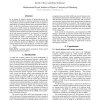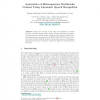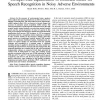202 search results - page 7 / 41 » Comparing Humans and Automatic Speech Recognition Systems in... |
INTERSPEECH
2010
13 years 3 months ago
2010
In an attempt to improve models of human perception, the recognition of phonemes in nonsense utterances was predicted with automatic speech recognition (ASR) in order to analyze i...
ACL
1998
13 years 10 months ago
1998
Miscommunication in speech recognition systems is unavoidable, but a detailed characterization of user corrections will enable speech systems to identify when a correction is taki...
SAMT
2007
Springer
14 years 2 months ago
2007
Springer
This paper reports on the setup and evaluation of robust speech recognition system parts, geared towards transcript generation for heterogeneous, real-life media collections. The s...
TASLP
2010
13 years 3 months ago
2010
In the presence of environmental noise, speakers tend to adjust their speech production in an effort to preserve intelligible communication. The noise-induced speech adjustments, c...
BIOSTEC
2008
13 years 10 months ago
2008
This paper presents our studies of automatic speech recognition based on electromyographic biosignals captured from the articulatory muscles in the face using surface electrodes. W...



